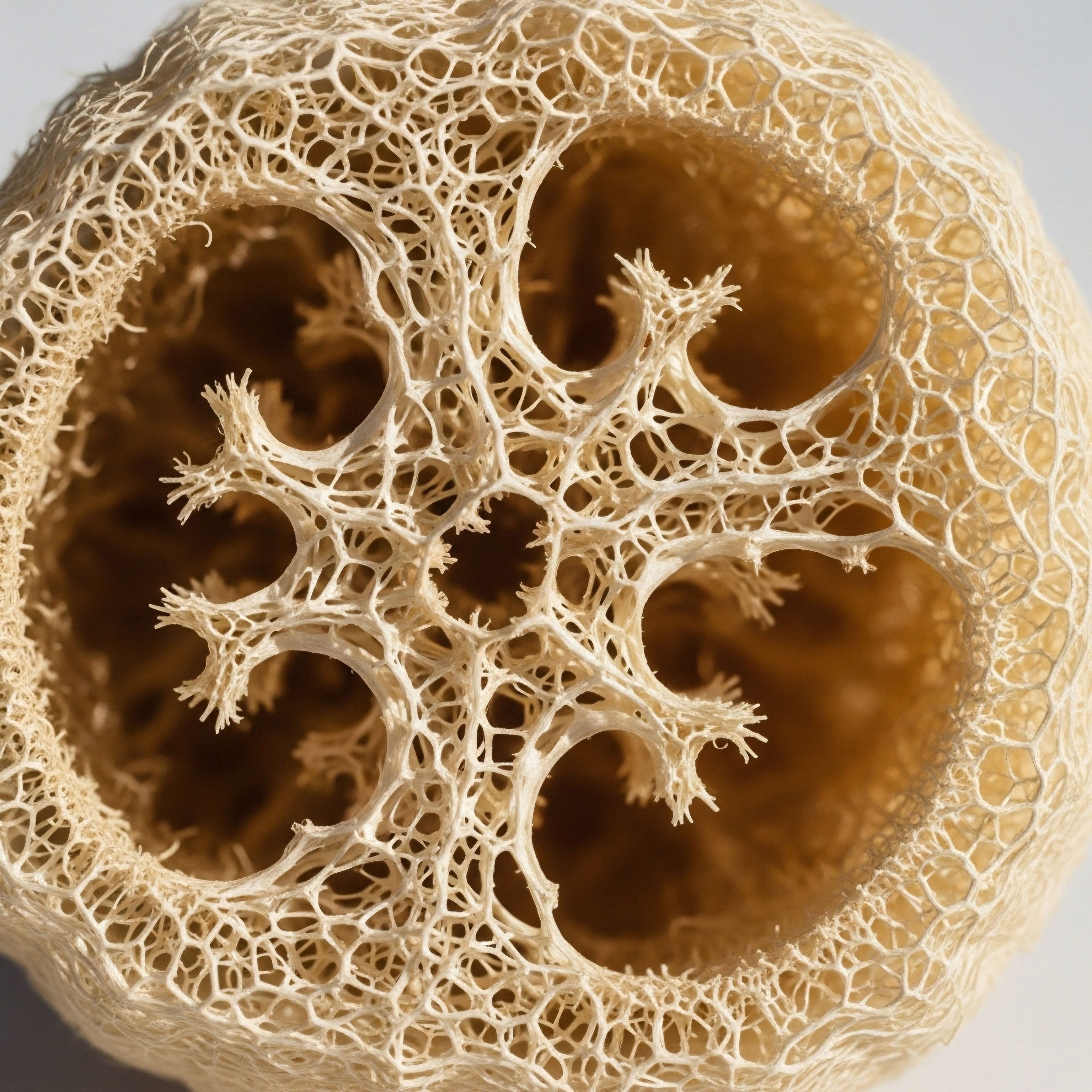

Fundamentals
You may be considering testosterone gel therapy and find yourself confronted with a landscape of conflicting information regarding its effects on the heart. One source suggests cardiovascular risk, while another points toward metabolic benefits. This experience of uncertainty is a valid and common starting point.
Your body is a deeply interconnected system, and a change in one area, such as a primary hormone, will inevitably send signals throughout the entire structure. Understanding how testosterone gels influence long-term cardiovascular health begins with appreciating the hormone’s role as a fundamental biological communicator.
Testosterone is a key signaling molecule that interacts with nearly every tissue type, including the intricate network of your heart and blood vessels. Its presence, or lack thereof, helps to direct the function of the cells that line your arteries, known as the endothelium.
A healthy endothelium is flexible and produces substances that allow blood to flow freely. When testosterone levels are optimized, the hormone supports the production of nitric oxide, a critical molecule that helps blood vessels relax and widen, a process called vasodilation. This action helps maintain healthy blood pressure and ensures efficient oxygen delivery to all your organs, including the heart muscle itself.
The conversation about testosterone therapy and cardiovascular health is a conversation about restoring a key signaling molecule within a complex biological system.

The Vascular System as a Dynamic Environment
Viewing the cardiovascular system as a network of passive tubes is an incomplete picture. It is a dynamic, responsive environment. The cells within your arteries are constantly reacting to signals from hormones, nutrients, and inflammatory messengers. Low testosterone can alter this environment, contributing to a state where the endothelium becomes less responsive and more susceptible to inflammation. This can set the stage for the development of atherosclerosis, the process where plaques build up inside arteries.
The goal of hormonal optimization with testosterone gel is to reintroduce a vital signal that helps restore balance to this environment. By providing a steady, daily supply of testosterone through the skin, the gel aims to replicate the body’s natural production rhythm. This steady state supports the biological machinery responsible for maintaining vascular health.
The process is a gradual recalibration, influencing cellular behavior over months and years. The focus is on creating conditions within the blood vessels that favor flexibility, reduce inflammation, and support the heart’s own metabolic needs.

What Is the Direct Role of Testosterone in Heart Function?
The heart is a muscle, and like other muscles in the body, it has receptors for testosterone. The hormone has a direct influence on the heart’s structure and energy consumption. Maintaining physiological testosterone levels is associated with healthy cardiac muscle mass. Furthermore, testosterone interacts with the electrical signaling system of the heart.
The way each individual’s cardiovascular system responds to testosterone therapy is deeply connected to their baseline health. Factors like pre-existing arterial plaque, metabolic health, and genetic predispositions all contribute to the ultimate outcome. This is why a standardized protocol is always tailored to the individual’s specific biological context, monitored by a clinician who understands this complex interplay.


Intermediate
Moving beyond foundational concepts, a clinical examination of testosterone gel’s influence on cardiovascular health requires a detailed look at specific biological markers. When testosterone is administered transdermally, it is absorbed into the bloodstream and begins to interact with multiple physiological pathways. The effects are not isolated; they represent a systemic recalibration that can be tracked through laboratory testing. Understanding these changes provides a clearer picture of how long-term cardiovascular function is shaped by hormonal optimization.
The application of testosterone gel initiates a cascade of effects on several key regulators of cardiovascular health. These are not simple on-off switches but are more like dials being adjusted on a complex control panel. The primary areas of influence include lipid metabolism, red blood cell production, inflammatory responses, and insulin sensitivity. Each of these systems is a pillar of cardiovascular wellness, and testosterone’s modulatory role in each one contributes to the overall long-term outcome.
Clinical monitoring of specific biomarkers is essential to ensure testosterone therapy guides the cardiovascular system toward a state of improved function and stability.

Modulation of Cardiovascular Risk Factors
The influence of testosterone on the body’s systems is multifaceted. By examining its effect on specific, measurable parameters, we can construct a more precise model of its cardiovascular impact. The following areas are of primary interest during any hormonal optimization protocol.

Lipid Profile Adjustments
One of the most frequently discussed topics is testosterone’s effect on cholesterol. The data suggests that transdermal testosterone therapy can cause modest changes in a person’s lipid profile. Specifically, some studies show a slight decrease in High-Density Lipoprotein (HDL) cholesterol, often referred to as “good” cholesterol because it helps remove other forms of cholesterol from the bloodstream.
There may also be a corresponding small reduction in Total Cholesterol and Low-Density Lipoprotein (LDL) cholesterol. The clinical significance of these shifts is a subject of ongoing study. The total cholesterol to HDL ratio is a key metric that clinicians monitor, as it provides a more comprehensive view of cardiovascular risk than any single lipid value alone.

Erythropoiesis and Hematocrit
Testosterone directly stimulates the bone marrow to produce more red blood cells, a process called erythropoiesis. This leads to an increase in hematocrit, which is the percentage of red blood cells in the blood. While this effect can be beneficial for correcting anemia in men with hypogonadism, an excessive rise in hematocrit can increase blood viscosity, or thickness.
Thicker blood may elevate the risk of thromboembolic events, such as a blood clot. Transdermal gels are generally associated with a less pronounced rise in hematocrit compared to intramuscular injections, but regular monitoring of complete blood counts is a standard and non-negotiable part of any testosterone therapy protocol to ensure hematocrit remains within a safe range.
| Biomarker | General Effect of Testosterone Therapy | Clinical Consideration |
|---|---|---|
| HDL Cholesterol |
May cause a slight to modest decrease. |
The clinical impact is evaluated in the context of the overall lipid profile, particularly the Total Cholesterol/HDL ratio. |
| LDL Cholesterol |
Variable effects, often showing a slight decrease or no significant change. |
Changes are monitored alongside other markers like triglycerides and apolipoprotein B. |
| Hematocrit |
Increases due to stimulation of red blood cell production. |
Requires regular monitoring to prevent polycythemia (excessively high hematocrit), which increases clotting risk. |
| C-Reactive Protein (CRP) |
May decrease, indicating a reduction in systemic inflammation. |
Lowering inflammation is a key mechanism for improving endothelial function and reducing atherosclerotic risk. |
| Blood Pressure |
Variable effects; may cause a slight increase in some individuals, while improving vasodilation may have a neutral or beneficial effect in others. |
Regular blood pressure monitoring is essential, especially in men with pre-existing hypertension. |
| Insulin Sensitivity |
Generally improves, leading to better glucose control. |
Improved metabolic function reduces a major risk factor for cardiovascular disease. |

Essential Monitoring during Gel Therapy
A personalized wellness protocol involving testosterone gel is built on a foundation of diligent monitoring. This ensures the therapeutic goals are met while maintaining safety. The following are core components of a monitoring plan:
- Baseline Assessment ∞ Before initiating therapy, a comprehensive evaluation is performed. This includes a full medical history, symptom evaluation, and laboratory tests for total and free testosterone, a complete blood count (CBC), a comprehensive metabolic panel, a lipid panel, and prostate-specific antigen (PSA).
- Follow-Up Testing ∞ Blood levels are typically re-checked at the 3-month and 6-month marks, and then annually once a stable state is achieved. The primary goals are to confirm testosterone levels are within the optimal therapeutic range and to monitor hematocrit and PSA.
- Symptom Review ∞ Ongoing consultation with a clinician is vital to correlate laboratory data with the individual’s subjective experience of well-being, energy levels, and libido.
- Cardiovascular Risk Reassessment ∞ Blood pressure and lipid profiles are periodically reviewed to ensure the overall cardiovascular risk profile is stable or improving.


Academic
A sophisticated analysis of the long-term cardiovascular implications of testosterone gels requires a critical appraisal of the highest level of clinical evidence. For years, the scientific community operated with data from observational studies and smaller, shorter-term randomized controlled trials (RCTs), which yielded conflicting results and fueled debate.
The publication of the Testosterone Replacement Therapy for Assessment of Long-Term Vascular Events and Efficacy Response in Hypogonadal Men (TRAVERSE) trial in 2023 represents a significant development in this field. This large-scale, multicenter, double-blind, placebo-controlled non-inferiority trial was specifically designed to address the safety concerns mandated by the U.S. Food and Drug Administration (FDA).
The TRAVERSE study enrolled 5,246 men between the ages of 45 and 80, all of whom had symptomatic hypogonadism (two fasting testosterone levels <300 ng/dL or 10.4 nmol/L) and either pre-existing cardiovascular disease or a high risk for it. Participants were randomized to receive a daily 1.62% transdermal testosterone gel or a placebo gel. The dose of the testosterone gel was adjusted to maintain serum testosterone levels within the physiological range of 350 to 750 ng/dL (12 to 26 nmol/L). The primary safety endpoint was a composite of major adverse cardiac events (MACE), defined as death from cardiovascular causes, non-fatal myocardial infarction, or non-fatal stroke.
The TRAVERSE trial established non-inferiority for transdermal testosterone therapy concerning major adverse cardiac events in a high-risk population, fundamentally shifting the evidence base.

Interpreting the Nuances of the TRAVERSE Trial
The primary outcome of the TRAVERSE trial showed that testosterone therapy was non-inferior to placebo for the MACE endpoint. This means that over a mean follow-up of 22 months, the use of testosterone gel did not result in a statistically significant increase in the risk of heart attack, stroke, or cardiovascular death compared to placebo in this specific high-risk population. This finding provides a substantial degree of reassurance regarding the cardiovascular safety of appropriately monitored testosterone therapy.
However, a granular analysis of the secondary endpoints reveals a more complex picture. The trial reported a statistically significant higher incidence of a few adverse events in the testosterone group. These included:
- Atrial Fibrillation ∞ There was a higher incidence of atrial fibrillation, a type of irregular heartbeat. The absolute risk was still low, but the difference was statistically significant.
- Acute Kidney Injury ∞ A small but statistically significant increase in acute kidney injury was observed.
- Pulmonary Embolism ∞ The incidence of pulmonary embolism was also slightly higher in the testosterone group, which aligns with the known effects of testosterone on hematocrit and potential clotting risk.
These findings underscore the principle that testosterone is a potent hormone with systemic effects. While the primary MACE endpoint was reassuring, the secondary findings highlight specific areas that require clinical vigilance. The increased incidence of atrial fibrillation, for example, suggests that testosterone may influence cardiac electrophysiology, a mechanism that warrants further investigation.

How Does TRAVERSE Compare to Previous Research?
The results of TRAVERSE stand in contrast to some earlier, more alarming studies that shaped the regulatory landscape. For instance, a 2013 observational study by Vigen et al. and a 2010 RCT by Basaria et al. both suggested increased cardiovascular risk, leading to the FDA’s black box warning.
The TRAVERSE trial’s robust methodology, including its large sample size, randomized placebo-controlled design, and active dose management, provides a higher quality of evidence. It demonstrates that when testosterone levels are carefully managed within a therapeutic window, the risks suggested by older, less controlled studies are not observed for major cardiac events.
| Study | Year | Design | Population | Primary Finding Regarding CV Events |
|---|---|---|---|---|
| Basaria et al. (TOM) | 2010 |
RCT |
209 older men with mobility limitations |
Trial stopped early due to a higher number of cardiovascular-related events in the testosterone group. |
| Vigen et al. | 2013 |
Retrospective Cohort |
8,709 male veterans with low testosterone |
Associated testosterone therapy with an increased risk of all-cause mortality, MI, and stroke. |
| Hudson et al. (Meta-Analysis) | 2017 |
IPD Meta-Analysis |
3,431 men across 17 studies |
Found no evidence of increased short-to-medium term cardiovascular risk. |
| Lincoff et al. (TRAVERSE) | 2023 |
Large RCT (Non-inferiority) |
5,246 men with hypogonadism and high CV risk |
Testosterone gel was non-inferior to placebo for MACE; no increased risk of MI, stroke, or CV death. |
The academic conclusion is that the conversation has evolved from “is testosterone dangerous for the heart?” to “for whom is it safe, and how do we best manage its systemic effects?”.
The TRAVERSE trial provides strong evidence that for a well-defined population of men with hypogonadism and high cardiovascular risk, transdermal testosterone, when used to achieve physiological levels, does not increase the rate of major adverse cardiac events. The findings on arrhythmias and thromboembolic risk reinforce the absolute necessity of a comprehensive, personalized approach to therapy, with diligent monitoring and a clear understanding of the patient’s complete health profile.

References
- Jones, T. Hugh. “Long Term Cardiovascular Safety of Testosterone Therapy ∞ A Review of the TRAVERSE Study.” The World Journal of Men’s Health, vol. 42, no. 1, 2024, pp. 1-10.
- Lincoff, A. Michael, et al. “Cardiovascular Safety of Testosterone-Replacement Therapy.” New England Journal of Medicine, vol. 389, no. 2, 2023, pp. 107-117.
- Hudson, J. et al. “Adverse cardiovascular events and mortality in men during testosterone treatment ∞ an individual patient and aggregate data meta-analysis.” The Lancet Healthy Longevity, vol. 3, no. 6, 2022, pp. e381-e393.
- Xu, Le, et al. “Testosterone therapy and cardiovascular events among men ∞ a systematic review and meta-analysis of placebo-controlled randomized trials.” BMC Medicine, vol. 11, no. 108, 2013.
- Basaria, Shehzad, et al. “Adverse Events Associated with Testosterone Administration.” New England Journal of Medicine, vol. 363, no. 2, 2010, pp. 109-122.
- Vigen, Rebecca, et al. “Association of testosterone therapy with mortality, myocardial infarction, and stroke in men with low testosterone levels.” JAMA, vol. 310, no. 17, 2013, pp. 1829-1836.
- Snyder, Peter J. et al. “Effects of Testosterone Treatment in Older Men.” New England Journal of Medicine, vol. 374, no. 7, 2016, pp. 611-624.
- Corona, Giovanni, et al. “Cardiovascular risk associated with testosterone-boosting medications ∞ a systematic review and meta-analysis.” Expert Opinion on Drug Safety, vol. 13, no. 10, 2014, pp. 1327-1351.

Reflection
The information presented here moves the question of testosterone gels and cardiovascular health from a place of ambiguity to one of clinical clarity. You now have a framework for understanding testosterone not as a standalone substance, but as an integral part of your body’s complex internal communication network. The data from large-scale trials provides a significant measure of reassurance, grounding the conversation in evidence. This knowledge is the foundational step in your personal health investigation.
Consider the systems within your own body. Think about the interplay between your energy levels, your metabolic health, and your sense of vitality. The journey toward optimal function is a personal one, guided by data but defined by your unique biology and life circumstances.
The path forward involves a partnership with a clinical guide who can help you interpret your body’s signals, analyze your personal data, and create a protocol that is precisely calibrated for you. The potential for renewed function and vitality is built upon this foundation of deep, personalized understanding.



